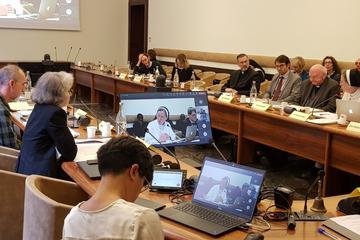
ROME — A well-known New Testament Studies scholar and author of “Short Stories by Jesus: The Enigmatic Parables of a Controversial Rabbi” will be the next speaker in the VPI series at The Lay Centre Feb. 21 at 5 p.m.
Dr. Amy-Jill Levine is a professor of New Testament and Jewish Studies, Mary Jane Werthan Professor of Jewish Studies, and professor of New Testament Studies at Vanderbilt Divinity School and College of Arts and Science. On Feb. 21, she will speak to those gathered at The Lay Centre on the topic, “Of Pearls and Prodigals: Hearing Jesus’ Parables as Jewish Stories.”
The Lay Centre caught up with Dr. Levine ahead of her lecture, where she shared her ideas, research and insightful comments on how studies of the New Testament from a Jewish perspective can help develop Jewish-Christian relations.
Q. Prof. Levine, there are many layers that were added by Christian tradition to the reading of Scripture. Could you name for us an important element that you realize Christians may tend to miss when interpretations make them lose contact with the actual context of a text?
Dr. Levine: All texts have to be interpreted: we can read what they “say” but we then have to determine what they “mean.” The more we know about their historical contexts, the better able we are to determine what they might have meant to the people who first heard them. Moreover, if we get the historical context wrong, we’ll misunderstand the text.
For example, unless we know who priests, Levites, and Samaritans are, we will miss the insight of the “Good Samaritan” in Luke 10; unless we know about first-century Jewish women’s lives, we will misunderstand the roles of Mary and Martha.
Q. What is your experience of teaching Scripture that holds a particular place for a community other than the one to which you belong?
Dr. Levine: The New Testament preserves Jewish history. Its major figures are Jews. Paul is a Jew, as likely were the authors of the Gospels of Matthew and John. The events it describes relate to Jewish communities, and interpretation of the text, over the centuries, has impacted Jewish lives. Indeed, the New Testament fills in parts of Jewish history that I did not learn in the Synagogue. For example, the first person in literature ever called “Rabbi” is Jesus of Nazareth; the only Pharisee from whom we have written records is Paul of Tarsus.
I, as an outsider to the Christian community, can show my students how profound, and how challenging the New Testament texts are. That makes my students, who are studying to be priests, ministers and religious educators, appreciate their Scripture even more.
Finally, I show my students how certain interpretations, especially regarding Jews and Judaism, lead to hate rather than love. To proclaim hate is to deform the Gospel.
Q. Could you tell us something more about the outstanding academic project of “The Jewish Annotated New Testament”?
Dr. Levine: “The Jewish Annotated New Testament,” which I co-edited with Marc Z. Brettler, is now in its second edition (2017, Oxford University Press). It brings together an international group of approximately 70 Jewish scholars to provide introductions to and notes on every book of the New Testament, as well as dozens of short essays on such subjects as Pharisees, the Dead Sea Scrolls, Jewish family life, and Jewish views of Jesus, Mary the mother of Jesus, and Paul of Tarsus. In cases where misunderstandings of Jews and Judaism arise in Christian preaching and teaching, we have special sections that indicate the problems and correct them.
Q. In a few weeks you will be giving a lecture at The Lay Centre in Rome focusing on parables. What message could they have for Christians and Jews today? Do you think parables might help foster dialogue between these two communities?
Dr. Levine: While Jews and Christians will not agree on matters such as the Trinity or the role of Jesus as Messiah and Lord, we can agree that the parables are brilliant short stories designed to help us ask the right questions. The parables personally challenge me; one does not need to worship Jesus as Lord in order to appreciate his teachings. I have already seen Jews and Christians have splendid conversations about parables; I am hoping we can have more at The Lay Centre.
My book, “Short Stories by Jesus: The Enigmatic Parables of a Controversial Rabbi” — the volume is currently being translated into Italian — is already serving as a prompt for Jewish-Christian dialogue. Together with my good friend, the noted children’s book author and rabbi, Sandy Eisenberg Sasso, I have also written three books for children on parables: “Who Counts? 100 Sheep” and “10 Coins and 2 Sons,” on the parables of Luke 15, and “The Marvelous Mustard Seed” and “Who is My Neighbor?” the latter on the Good Samaritan. All these publications show that Jesus the Jewish storyteller might become a bridge between Jews and Christians, rather than simply a wedge.
Q. A more personal question: what is your favourite parable and why?
Dr. Levine: Whichever one I happen to be discussing with others interested in parables.
Dr. Amy-Jill Levine will give her lecture at The Lay Centre Feb. 21 at 5 p.m. Register here for the event.


